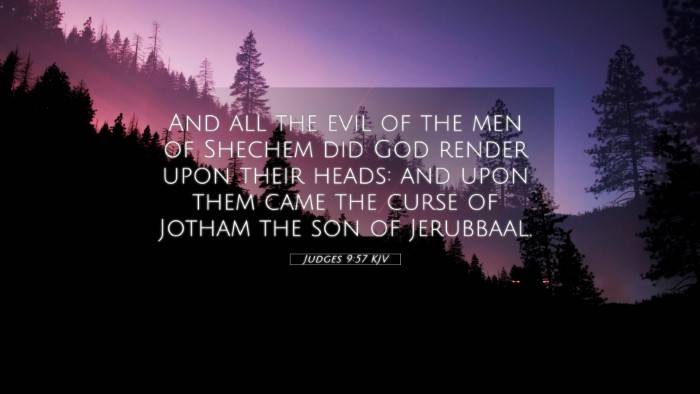Bible Verse Interpretation: Judges 9:57
Judges 9:57: "And all the evil of the men of Shechem did God render upon their heads: and upon them came the curse of Jotham the son of Jerubbaal." This verse concludes the tragic story of Abimelech and his unjust reign over Shechem, highlighting the principle of divine justice.
Meaning and Explanation
This verse signifies that the malevolence, treachery, and sin of the Shechemites were recognized and punished by God. The mention of Jotham's curse indicates that divine retribution came as a fulfillment of a prophetic warning.
Matthew Henry's Commentary: Henry emphasizes the sovereignty of God in executing judgment. He notes that the people of Shechem, who had supported Abimelech in his rise to power, experience the consequences of their actions. Their evil intentions brought upon themselves the punishment foretold by Jotham.
Albert Barnes' Commentary: Barnes interprets this verse in the context of justice and moral order in society. He points out that God observes and holds individuals accountable for their actions. The consequences reflect God’s overarching power to bring about justice in both individual lives and communities.
Adam Clarke's Commentary: Clarke expands on the idea that the curse of Jotham was a declaration and a warning that was ultimately effective. He remarks on the themes of retribution and inevitability, stressing the law of sowing and reaping that governs human behavior.
Key Themes
- Divine Justice: God’s punishment of the Shechemites proved that evil deeds do not go unpunished.
- Consequences of Leadership: Those who support wicked leaders share in the consequences of their actions.
- Prophetic Fulfillment: The curse forewarned by Jotham manifests, highlighting God's fidelity to His word.
- Community Accountability: The collective decisions of a community can lead to communal repercussions.
- Moral Order: God’s governance of right and wrong implies that moral order is essential for societal well-being.
Bible Cross-References
This verse can be closely linked to several other passages that reflect on the themes of justice, divine retribution, and community accountability:
- Galatians 6:7 - "For whatever a man sows, that he will also reap." – Emphasizes the principle of sowing and reaping in moral conduct.
- 2 Samuel 11:27 - Discusses the consequences of David's actions regarding Bathsheba, highlighting God’s judgment.
- Lamentations 3:64-66 - Expresses the idea of God repaying evil according to its actions.
- Job 4:8 - "As I have seen, those who plow iniquity and sow trouble reap the same." – Similar theme of retribution.
- Psalm 7:16 - "His mischief shall return upon his own head..." – Reflects on the law of inverse consequence.
- Proverbs 11:21 - "Though hand join in hand, the wicked shall not be unpunished." – Highlights communal accountability.
- Matthew 7:2 - "For with what judgment you judge, you will be judged." – Stresses the principle of reciprocal justice.
Connecting Themes
This verse sparks an inter-Biblical dialogue concerning the nature of justice and accountability across various narratives. These connections provide insight into God's unchanging nature in dealing with humanity.
Tools for Biblical Cross-Referencing
To dive deeper into cross-referencing Biblical texts like Judges 9:57, consider these resources:
- Bible Concordance - A useful tool for finding occurrences of specific words or themes across different books.
- Bible Cross-reference Guide - Helps to trace themes and principles shared between various scriptures.
- Bible Reference Resources - Comprehensive databases or apps to locate related verses effortlessly.
- Bible Chain References - Systems designed to connect verses thematically for deeper understanding.
Practical Applications
Understanding the implications of Judges 9:57 encourages readers to reflect on their own actions and their consequences both personally and communally. It underscores the importance of righteous living and the dangers of unrighteous associations.






